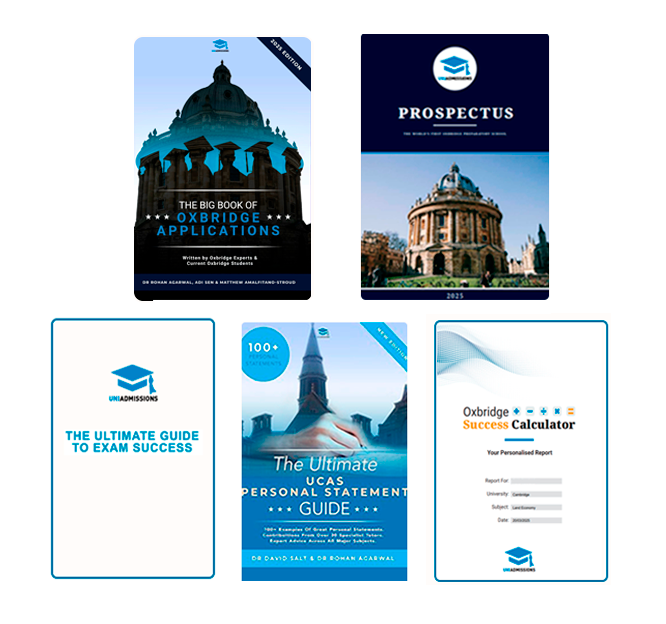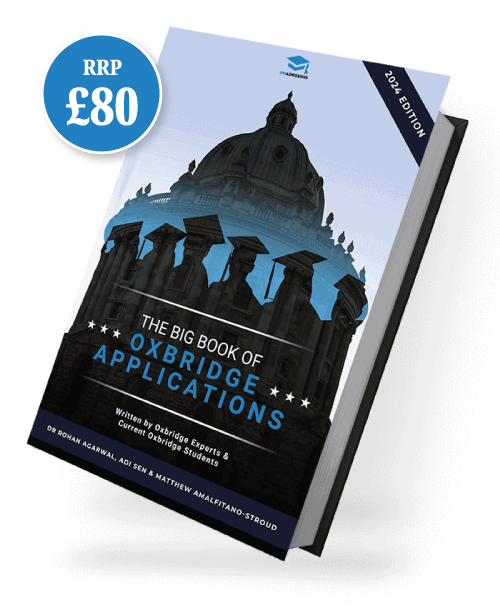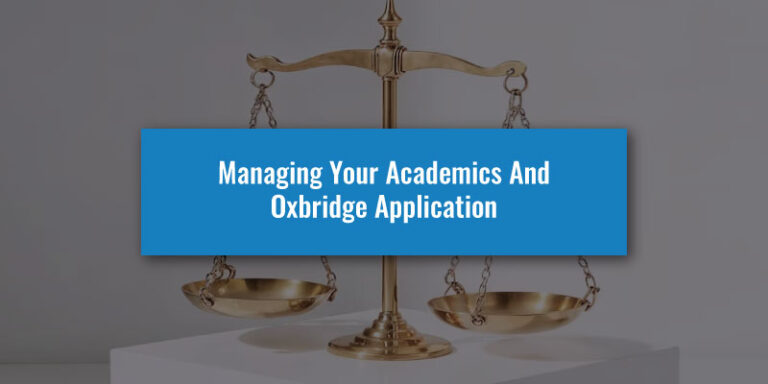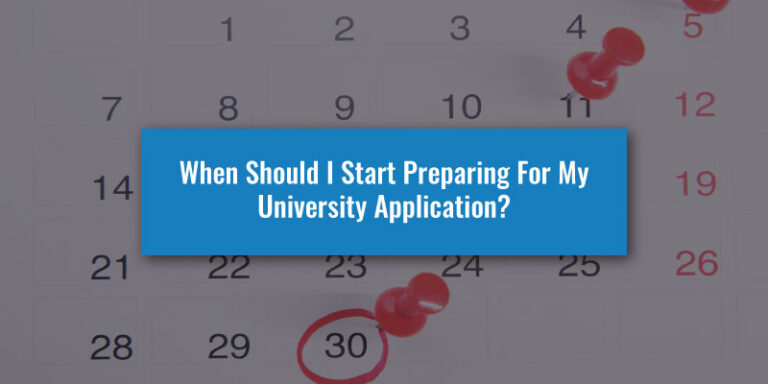The University of Oxford and the University of Cambridge are infamous for their use of challenging admissions tests in many of their courses. However, not every course requires an admissions test to be sat, so how do these courses differentiate between different candidates?
Instead of standardised testing, many Oxbridge courses opt to request written work and other forms of submitted work from their applicants. This process is usually less demanding than sitting an additional test, but it’s still important to be aware of what you need to submit and how the process works.
In this guide, we’ll go through everything you need to know about submitting work for your Oxbridge application so that you can complete your application with ease.
What Is Oxbridge Written Work?
The first thing you may be wondering is what written work actually means in the context of Oxbridge applications. In simple terms, it’s an admissions requirement from the universities that requires you to send a piece of work that fits set specifications. Not every applicant will need to submit written work, but there are a fair amount of courses that require it.
When it comes to what you’ll be submitting, here are some examples of the most common types of work required:
- Essays
- Commentaries
- Portfolios
- Artwork
- Compositions
- EPQ Content
Specific requirements may be set for submitted work, be it word count restrictions, topics or the requirement to work to be formally marked by your teachers. In some cases, the course may specify that the work needs to be written specifically for the application, while others will require work that was written during your standard education. At Cambridge, some courses only require submissions for certain colleges.
When it comes to what you’ll be submitting, here are some examples of the most common types of work required:
Oxford Written Work Requirements
| Archaeology and Anthropology (LV64) | 2 Essays (recently marked) + a 500-word essay answering a given prompt. |
| Asian and Middle Eastern Studies | 2 Essays (recently marked). |
| Classical Archaeology and Ancient History (VV14) | 2 Essays (recently marked). |
| Classics (Q800) | 2 essays or commentaries relating to Classics. |
| Classics and Asian and Middle Eastern Studies | 2 pieces of written work (1 relating to Classics). |
| Classics and English | 2 pieces of written work (1 relating to Classics and 1 relating to English). |
| Classics and Modern Languages | 1 – 3 pieces of written work (One relating to Modern Languages written in your chosen language, 1 relating to Classics written in English, 1 relating to Modern Languages written in English). |
| English Language and Literature (Q300) | 1 Essay (Analytical piece relating to Eng, written during your standard course, recently marked, up to 2,000 words). |
| English and Modern Languages | 1 – 3 pieces of written work (One relating to Modern Languages written in your chosen language, 1 relating to English written in English, 1 relating to Modern Languages written in English). |
| European and Middle Eastern Languages | 2 pieces of written work (1 written in your chosen language, 1 written in English). |
| Fine Art (W100) | Artwork Portfolio (submitted digitally via Slideroom). |
| History (V100) | 1 Essay (relating to History). |
| History (Ancient and Modern) (V118) | 1 Essay (relating to History). |
| History and Economics (LV11) | 1 Essay (relating to History, recently marked). |
| History and English (VQ13) | 2 pieces of written work (1 relating to History, 1 relating to English). |
| History and Modern Languages | 2 pieces of written work (1 relating to History, 1 relating to Modern Languages). |
| History and Politics (LV21) | 1 Essay (relating to History). |
| History of Art (V350) | 2 pieces of written work (1 2,000-word essay sustaining a written argument, 1 personal response to a piece of art, architecture or design). |
| Modern Languages | 2 pieces of written work (1 written in your chosen language, 1 written in English). |
| Modern Languages and Linguistics | 2 pieces of written work (1 written in your chosen language, 1 written in English). Optional submission of A-Level Linguistic analysis piece. |
| Music (W300) | 2 Essays (Recently, marking, 1,500 words, doesn’t have to be about music). 1-2 marked harmonies or counterpoints. Video recording audition of a 5-minute performance. Optional submission of original composition. |
| Philosophy and Modern Languages | 2 pieces of written work (1 written in your chosen language, 1 written in English). |
| Philosophy and Theology (VV56) | 1 piece of written work (Written in English during your normal studies, up to 2,000 words). |
| Religion and Asian and Middle Eastern Studies (VT69) | 1 piece of written work (Written in English during your normal studies, up to 2,000 words). |
| Theology and Religion (V600) | 1 piece of written work (Written in English during your normal studies, up to 2,000 words). |
Cambridge Written Work Requirements
| Anglo-Saxon, Norse, and Celtic (QQ59) | 2 pieces of written work. |
| Archaeology (V400) | 1 Essay (1,500 word limit). |
| Architecture (K100) | Artwork Portfolio, (up to 6 A4 pages, digital submission). |
| Classics (Q800/Q801) | 2 pieces of written work. |
| Design (KH11) | Artwork Portfolio, up to 6 A4 pages (Digital). |
| Education (X300) | 2 pieces of written work. |
| English (Q300) | 2 pieces of written work. |
| History and Modern Languages (VR18) | 2 pieces of written work (recent school work, those applying for post A-level languages should include 1 piece in their chosen language). |
| History and Politics (VL12) | 2 pieces of written work. |
| History (V100) | 2 pieces of written work. |
| Human, Social, and Political Sciences (L000) | 2 pieces of written work. |
| Land Economy (KL41) | 1 – 2 pieces of written work (select colleges only). |
| Law (M100) | 2 pieces of written work (Pembroke & St Edmund’s only). |
| Linguistics (Q100) | 1-2 pieces of written work (select colleges only: 1 piece – St Edmund’s, 2 pieces -Churchill, Downing and Wolfson). |
| Modern and Medieval Languages (R800) | 2 pieces of written work (marked school work, 1 in your chosen language). |
| Music (W300) | Representative written work and musical material. |
| Psychological and Behavioural Sciences (C800) | 1-2 pieces of written work (select colleges only). |
| Theology, Religion, and Philosophy of Religion (V600) | 2 pieces of written work. |
As you can see, there’s a wide variety of requirements across all the different subjects at each university, although Cambridge courses are more likely to use the generic requirement for written work. If you’re not fully sure of what you need to submit to your college, there are further details on each course page as well as the option to contact the college directly.
Why Does Oxbridge Use Written Work?
Oxford and Cambridge use written work in the same way that they use admissions test results; to differentiate applicants by giving them a chance to more thoroughly present their abilities. However, while admissions tests are most commonly used as a test of subject knowledge and general skills, written work allows applicants to express their creativity, reasoning skills and independent thinking.
Structured exams work well for STEM subjects and courses that require more factual memorisation, open-ended writing tasks are a much better way of testing for humanities subjects that emphasise analysis and reasoning. Admissions tutors aren’t as interested in applicants who simply memorise facts and methods but instead research and engage with their subject effectively.
In some cases, written work requirements are the only feasible way of testing applicants. In courses like Fine Art and Music, where practical ability is arguably more important than theory, requiring submitted work is the only way for admissions tutors to view each applicant’s own style and skill.
One thing to bear in mind is that a small number of courses will require both an admissions test and submitted work, such as History and Classics. These aren’t very common, but it’s important to double-check on your course page that an admissions test won’t be required at any stage of the application.
Not sure what work you should submit to Oxbridge?
At UniAdmissions, we’ve spent over a decade supporting applicants for a wide range of courses through their entire application process, including their written work. Our expert tutors will help you with the process of choosing and submitting work to your college, as well as preparing you for your interview and offering guidance for your Personal Statement.
Discover our Oxbridge Programmes by clicking the button below to learn how you can enrol and triple your chances of success.
Types of Oxbridge Written Work
We understand why written work is used, but what kind of work will you actually be expected to submit? Let’s run through the different categories to see what you may need to provide to your admissions tutors:
Essays
These are the most common forms of written work that you will encounter. You can expect to be required to submit an essay for a variety of courses, including History, Modern Languages, Theology, Classics, English and even Music.
It will vary whether you need to write a specific essay or submit an essay that had been marked by a teacher during your standard classes. While you typically be asked to submit an essay relevant to the course, there are some occasions in which this isn’t the case. You may also be asked to submit two or more essays in some cases.
Commentaries
These are fairly similar to essays, although taking on a slightly more casual form. The main instance of these being requested is in Classics at Oxford. Most of the same conditions as essays apply here.
Portfolios/Artwork
Applicants for courses with an emphasis on visual arts will be required to submit a portfolio containing their artwork. This can be presented in a variety of ways, although it is requested that applicants include a range of work to give a sense of the applicant’s interests and abilities.
In some cases, applicants may be required to submit a select number of pieces rather than a full portfolio, though the requirement for a portfolio has become more common recently.
Compositions
Original musical compositions are accepted as written work at both Oxford and Cambridge, although it is optional. Both music courses require applicants to submit at least one essay and Oxford requires the submission of a teacher-marked harmony or counterpoint.
EPQ Content
Cambridge states in some cases that your written work can be taken from an Extended Project Qualification (EPQ) that you have completed alongside your studies. Ensure this work is relevant to the course and can function as a stand-alone piece of work.
Now that we understand what written work is, let’s explore how Oxford and Cambridge each handle the process of submitting work, starting with Oxford.
Access "The Oxbridge Application Vault"
- 300+ page ebook for Oxbridge Applicants
- 25 page ebook for Personal Statement
- 2h+ online course to succeed in any exam
- Online Oxbridge Success Calculator
- 12 page ebook about UniAdmissions

Access "The Big Book Of Oxbridge Applications" For FREE
Your written work is just one step in your Oxbridge application, so claim your free copy of The Big Book Of Oxbridge Applications here to learn about the full process. It contains over 350 pages of information covering every step of the application process, as well as:
- 28 example Oxbridge Personal Statements
- Over 40 admissions test practice questions
- Interviews with Oxbridge students and graduates
- Additional downloadable resources
Fill out the form below to claim your digital copy today!

How To Submit Written Work To Oxford
Written work submissions at Oxford are handled by your college of choice, who will contact you after your UCAS application has been submitted. In this correspondence, they will explain how to send your work and to whom. Typically, all work must be sent digitally, including handwritten work, which is eligible but must be scanned digitally.
Oxford has various rules and requests relating to written work submissions, including:
- All work must be submitted in English (unless otherwise specified in the entry requirements for your course).
- All work must be original and written by yourself.
- Each piece of work should not exceed 2,000 words.
- Each piece of work must be submitted with a cover sheet (this is available on the Oxford website).
In most cases, Oxford prefers or requires applicants to submit work that has been marked by an academic (usually the faculty at your school/college). However, cases where work needs to be written specifically won’t have this requirement.
In 2024, the deadline for submitting your work is November 10th. This excludes Fine Art Portfolios, which must be submitted on November 7th. Fine Art Portfolios are submitted via the digital program SlideRoom, which allows for up to 20 files to be uploaded in a variety of formats including images, videos and audio.
Oxford suggests that, if shortlisted for interviews, you re-read and familiarise yourself with the content of the work you submitted, as you may be asked about it by your interviewees.
How To Submit Written Work To Cambridge
Similar to Oxford, full instructions on where to submit your work will be sent to you by your college. Deadlines for submission vary from course to course and will be specified in your correspondence. However, some general rules to follow include:
- All work must be submitted digitally as a PDF, the file size shouldn’t exceed 100MB (15MB for Artwork submissions).
- Each piece of work should be submitted on an individual document.
- The document title should follow the format ‘Lastname_Firstname_UCAS ID_WrittenWork1’.
- All work must be submitted in English (unless otherwise specified in the entry requirements for your course).
- Each piece of work must be submitted with a filled-out cover sheet, available on the Cambridge website (some colleges may request you use a different cover sheet, you will be informed of this if so).
As with Oxford, your work should ideally be marked by a teacher unless otherwise stated and should be something you’re happy to discuss in your interviews. Cambridge even suggests bringing a copy of your work to the interviews.
Submitting written work shouldn’t take too much extra time in your application as you are typically requested to submit pre-written, marked work. However, deciding what to send and ensuring everything is correct can take a bit of time, but it’s important to be thorough and make sure everything is checked.
We hope this guide has helped you better understand what is required of you if you need to provide written work. If you’re looking for guidance on any other area of the Oxbridge admission process, including the Personal Statement, interviews and other general considerations, be sure to check out our extensive library of free admissions guides or claim your free copy of The Big Book of Oxbridge Applications.
If you’re looking for comprehensive guidance through your application, our Oxbridge Programmes offer the most effective way to prepare for each step of your application with support from expert tutors, intensive courses and a full suite of resources. Book a free admissions consultation today to learn how we can triple your chances of success.
Looking for complete Oxbridge support delivered by experts?
We’ve built upon our formula for Oxbridge success for over 10 years and have gotten 59% of our students their offer to study at Oxford or Cambridge. Our combination of one-to-one tuition, interactive live sessions and extensive resources are proven to boost each applicants chances of success.
Discover our Oxbridge Programmes by clicking the button below to learn how you can enrol and triple your chances of success.







